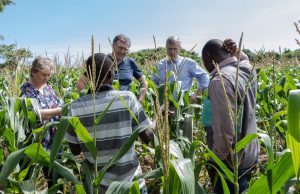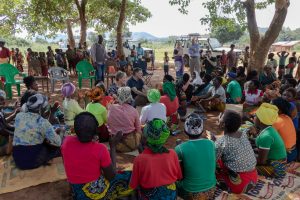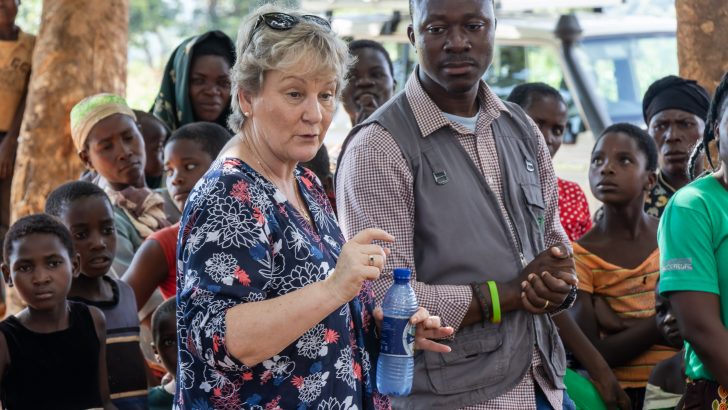Spring Legacy 2019 – Last Call to Action
Chai Brady discusses how Concern’s legacy donations can save lives
Journeying with people through thick and thin, whether it be a natural disaster, extreme conflict or starvation, Concern are committed to working with beleaguered populations in some of the most “heart-breaking” conditions.
Anne O’Mahony, International Programmes Director, says that despite years of alleviating severe acute malnutrition and tackling atrocities, it never ceases to amaze her “how inhumane people can be to each other, it just doesn’t seem to change”.
Concern are currently working in the world’s newest country, South Sudan, which is in a state of turmoil. It has the world’s third largest refugee crisis; over two million people are internally displaced.
Many of these people are victims of horrific crimes and are forced from their homes. “Very often then you’ll have marauding forces coming in attacking, burning, driving people out,” says Ms O’Mahony. “They burn down villages and houses. Unfortunately rape and gender based violence is very much a weapon of war in South Sudan, so people flee rather than hang around.”
The charity help operate PoC (Protection of Civilians) sites, where people go to seek protection and refuge from ongoing conflict.
Huge casualties
If there was no camps, Ms O’Mahony said there would be huge casualties, even while the charity work within the camps they “get attacked”.
“There is international protection forces in there, but the economy in South Sudan is shot to pieces, the currency continues to fluctuate, people don’t get very well paid particularly within the Sudanese Army because the Sudanese civil service can’t afford to pay them. They run rampant occasionally, so it’s not the easiest place in the world to work,” she said.
“At the end of the day there’s this great Swahili saying, when elephants fight it’s the grass that suffers. I think for every situation that we’re in when there is war and conflict it’s not the soldiers who suffer it’s the women and children who are caught in the middle who lose their homes, who are put on the road and who end up as refugees in camps like the PoCs in South Sudan and no way back.
“An awful lot of these camps are full of mothers and children who cannot survive at home and they’re the ones who really suffer the hardship of war.”
***
In the latest UN situation report on South Sudan, published this month, it stated food insecurity has increased and measles outbreaks have been confirmed in 11 countries. Concern manage a camp in Bentiu which has a population of 140,000. It was built by the charity and they manage and run it while also distributing food in several PoC camps around the capital, Juba.
In a dramatic gesture in April this year Pope Francis kissed the feet of the President of South Sudan, Salva Kiir and former deputy turned rebel leader Riek Machar. He urged them to continue on the road of peace and not to return to civil war after an armistice was signed.
“We are hoping against hope that it will be a force for peace and not a force for more evil and more terror and more war. We’re keeping an eye on it, we have a big staff in South Sudan, we have over 300 people working there, mainly national staff and that’s part of what we do as well, we train up the staff and they work with the people we work with to improve their ability to withstand these conflicts,” said Ms O’Mahony.
“We pass on the skills that we have and that’s very much part of what we do and it’s not only passing on the skills, it’s looking at building their confidence and their resilience and their ability to unite and withstand some of the horrors and to support each other.”
Currently a transitional government in the country is expected to be created in six months following a postponement on May 12, which charities hope will lead to a longer lasting peace and quelling of rampant violence across the country.
Positive Results
Concern sometimes spend decades in countries that are hardest hit by poverty, famine and general instability. It is not always a never-ending pursuit for positive results.
The charity have exited several countries they worked with after reaching a certain point in which they feel other organisations can take on the work that they began.
“We tend to go into countries and stay with them as long as we’re needed and then we exit. I don’t see us exiting from places like South Sudan, Somalia, Chad, Central African Republic, Democratic Republic of Congo or Burundi for many years to come,” said Ms O’Mahony. “But we stay as long as we’re needed and even though the conditions are difficult and even though our people live in pretty grim conditions we stay and we will continue to stay and really that’s one of the big things about Concern – we’re there for the long road really. I suppose I’m very proud of the fact that we do that, it would be much easier to leave.”
Concern exited Tanzania in 2017 after working there for almost 50 years and have been there consistently since the mid-70s. They left Uganda, Zambia and Nepal last year. Ms O’Mahony added that Nepal was always going to be a short stay as it was primarily an emergency response to the 2015 earthquake which killed almost 9,000 people.
“It would be much easier to say, ‘oh let’s stick to the likes of Uganda, let’s stay with country’s like Zambia’, which are quite pleasant and nice to work in but we’re not doing what we as an organisation were designed to do,” said Ms O’Mahony. “We’re there to work with the poorest in the most difficult conditions, in fragile states and in conditions that are against some of the normal levels of humanity that we would expect to be able to exist in.”

Ms O’Mahony revealed to the paper that a large legacy donation last year was used in the country to support a nutrition programme.
“This one was actually over €1 million, a single legacy, which we were able to put into nutrition in war-torn South Sudan. It enabled us to have a substantial impact there,” she said.
“People flee from the conflict into these camps and at this point in time there’s no way for them to go back to their home because of the conflict so they have to be fed and watered and maintained in those camps, so we’ve been able to use that legacy to help us do an awful lot of that work in South Sudan.”
The benefit of the charity receiving legacies is that by-and-large these donations are unrestricted, meaning they are not tied to any single project. When disaster strikes in a country these funds can be used to mobilise personnel and aid immediately to mitigate the extent of the crisis.
Cyclone Idai, which has been described as the worst disaster to strike the southern hemisphere, devastated Malawi as well as other African countries.
Concern were teaching locals and training leaders to use innovative techniques to improve agricultural production, or “climate smart agriculture”. They show them how to reduce climatic damage but also add value with the planting and production of grain.
Many of the labourers they interact with are women, so they also show how they can make some of the manual work more manageable. Once they are trained they then go on to train others in the community – leading to community led farming initiatives that reap the most out of available land.
“People flee from the conflict into these camps and at this point in time there’s no way for them to go back to their home because of the conflict”
Ms O’Mahony visited Malawi and was shown the impressive yields, but the farmers’ excitement was short lived as Cyclone Idai destroyed so much in the country, including the crops.
“It was heart-breaking really to see that they were so close to having a great harvest and it’s gone in a flash. Our ability to respond was dictated by the fact that we had money available to go in immediately,” Ms O’Mahony.
Their quick reaction was made possible by legacy donations. Concern say they were there “long before” any other agency, including bigger donors like the UN. The charity were able to start getting people out of danger and into camps and centres while working to save as many crops as possible.
Natural disaster
Although at the time of the natural disaster it was the end of the wet season, the cyclone had made the ground wet. This meant Concern could provide productive seeds that could be planted quickly so that locals had a chance of getting a harvest in two to three months.
Ms O’Mahony said: “That is the huge benefit of having finances and money at the ready to be able to respond and money that is untied to other programmes. It was enormous for us to be able to do that.”
About €2 million a year is received by Concern through legacy donations and sits in their general donations funds which can be used immediately to tackle an emergency whether it be a food crisis, natural disaster or conflict.
Tackling severe acute malnutrition in children is another major part of the charity’s work. This is caused by there being a huge lack or absence of food which leads to rapid onset weight loss. This emergency situation can be dealt with quite easily once food is made available, but if there is limited amounts of food being consumed over a long period of time this causes serious stunting in growing children.
This can affect many aspects of a person’s life through adulthood, including earning power and health even if there is intervention at a later stage of a long-term malnourished child’s development.
“It’s fairly shocking when you think about. We’re looking at Burundi at the moment where 56% of the population is stunted, that means over half the population will never reach their full potential, even if they get flooded with food as it stands at the moment,” Ms O’Mahony said.
“The big driver from our side is to prevent that malnutrition and to prevent the chronic malnutrition,” she said, while they can deal with severe acute malnutrition much more easily in an emergency situation “it’s the chronic one that is the most lethal, that is the most demeaning and depriving of a person’s capabilities over a longer period of time”.
***
The World Bank reported that stunting due to malnutrition has severe economic costs for a country in terms of national productivity and economic growth. This can range from 2-3% GDP and up to 11% GDP in Africa and Asia each year.
They state that the losses are largely preventable if adequate investments in proven interventions are made, particularly those that focus on ensuring optimal nutrition in the critical 1000-day window between the start of a woman’s pregnancy and her child’s second birthday.
Even though the prevalence of child stunting in Sub-Saharan Africa fell from 49% in 1990 to 34% in 2017, the total number of stunted children in Africa increased by 13.9 million during the same period as a result of high fertility rates and lower rates of decline in stunting.
Concern tackle starvation and malnutrition through several initiatives including health clinics that offer stabilisation of acute cases. Plumpy’Nut, a peanut-based paste, can be used to treat large amounts of people without the need for hospitalisation. Many mothers can use it to feed their children at home before the situation is able to deteriorate.
If a mother or child’s health gets worse dramatically they can go to a stabilisation centre, where they’re put on a number of medicines to deal with malaria, worms and many infections. They are then brought home as quickly as possible before they pick up any illnesses from neighbouring patients.

Malnourished
“When you’re very ill and very malnourished your ability to fight disease and fight illness is really low, so you’re going to pick up every infection that’s passing, that otherwise you might resist.
“A sneeze from me might infect half the population in front of me if they are malnourished and that would rapidly develop then into pneumonia so I suppose the thing is to make sure that the illnesses are treated as quickly as possible, that you build that resilience, and then you get them out of harm’s way.”
When a charity like Concern is not able to immediately respond to disasters, the situations “deteriorates rapidly” and is the difference between life and death.
Ms O’Mahony added: “This is where legacies really come in, that flexibility enables us to respond and to protect populations before they begin to deteriorate into situations that are hugely damaging for the individuals themselves and then hugely costly to correct. The longer we wait the more expensive it is and the greater the hardship that occurs as a result so being ready, willing and able with that capacity to respond is hugely important for us.”


 Chai Brady
Chai Brady Anne O’Mahony and Chris
Mjima, Concern’s Livelihoods
and Resilience Coordinator,
addressing a village meeting in
Kwilapo, Malawi.
Anne O’Mahony and Chris
Mjima, Concern’s Livelihoods
and Resilience Coordinator,
addressing a village meeting in
Kwilapo, Malawi. 